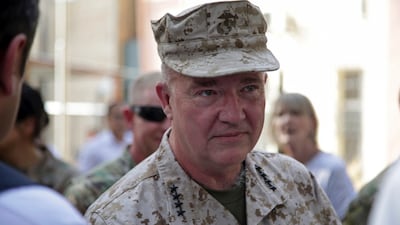Gen Frank McKenzie, the former head of US Central Command, said on Sunday that ISIS has a “strong desire” to attack the US and other nations and called future attacks “inevitable”.
“We should believe them when they say that they're going to try to do it [carry out attacks],” Gen McKenzie told ABC's This Week.
“I think we should expect further attempts of this nature against the United States as well as our partners and other nations abroad. I think this is inevitable.”
As head of Centcom, a role he held until 2022, Gen McKenzie oversaw the raid on the home of ISIS leader Abu Bakr Al Baghdadi in October 2019, as well as the US withdrawal from Afghanistan two years later.
Gen McKenzie said ISIS, particularly ISIS-Khorasan Province, which operates primarily in Afghanistan, posed a significant threat to countries including the US. The group claimed responsibility for an attack in Moscow last week that killed 144 people.
“ISIS-K seeks to conduct external attacks … away from their homeland,” he said, adding that the group holds Russia accountable for actions against it in Syria.
“Of course, they're not under a great deal of pressure in Afghanistan and so when you're not under pressure at your home base, you have the opportunity to reach out.”
The Taliban, which took control in Afghanistan after the withdrawal of US and allied coalition troops, have been in a bitter battle against ISIS-K. As US troops were leaving the country, ISIS-K carried out a bombing at Kabul airport killed dozens of Afghan civilians, as well as 13 US troops.
With no pressure exerted on ISIS-K in Afghanistan since the US withdrawal, Gen McKenzie said the group had been “free to gain strength, they're free to plan, they're free to co-ordinate”.
But it is “self-radicalisation” through literature or the internet that he pointed to as one of the greatest threats.
Radicalising people abroad over the internet “may be one of the most dangerous methods that ISIS can use to generate attacks”, he explained.
Attacks may be less co-ordinated and not well planned, but this only makes them harder to stop as they are more difficult to detect.
Gen McKenzie had been a proponent of keeping some US troops in Afghanistan after the larger withdrawal to serve alongside troops from allied nations to maintain pressure on ISIS-K.
“You'd much rather be playing an away game than a home game,” he said, referring to how the US withdrawal has allowed ISIS-K to regroup and begin to plan for attacks abroad. “We've chosen to play a home game.”

